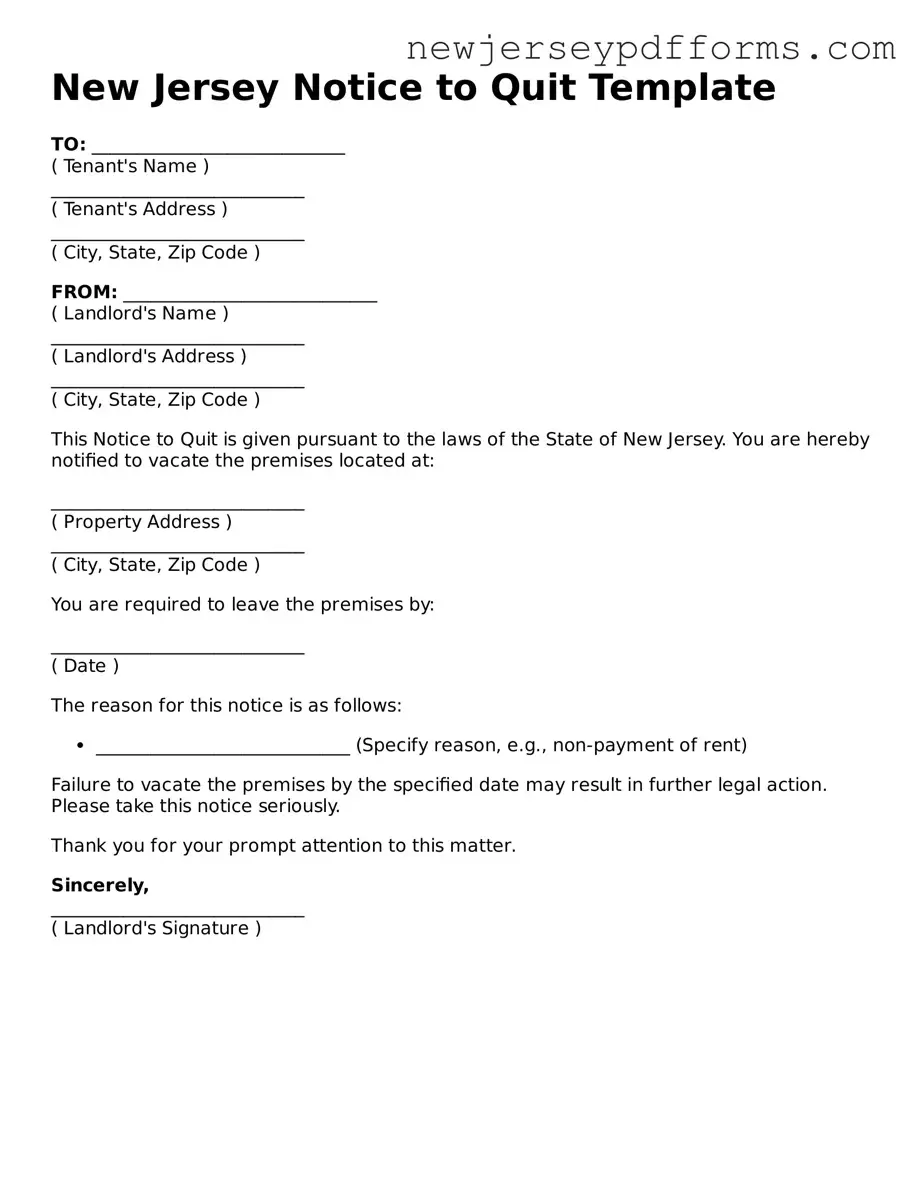What is a Notice to Quit in New Jersey?
A Notice to Quit is a legal document that a landlord issues to a tenant to terminate a rental agreement. It informs the tenant that they must vacate the premises by a specified date. This notice is typically used when a tenant has violated the lease terms, such as failing to pay rent or engaging in illegal activities on the property.
How does a landlord serve a Notice to Quit?
In New Jersey, a landlord can serve a Notice to Quit in several ways. The most common methods include personal delivery to the tenant, leaving the notice with someone of suitable age at the tenant's residence, or sending it via certified mail. It’s crucial for the landlord to ensure that the notice is served correctly to avoid delays in the eviction process.
What information must be included in the Notice to Quit?
A proper Notice to Quit should include specific details. This includes the tenant's name, the address of the rental property, the reason for termination, and the date by which the tenant must vacate. Additionally, it should be signed and dated by the landlord or their representative. Clear communication helps prevent misunderstandings.
How long does a tenant have to respond to a Notice to Quit?
The timeframe for a tenant to respond to a Notice to Quit depends on the reason for the notice. For non-payment of rent, the tenant typically has 30 days to pay the overdue amount or vacate the property. For other lease violations, the notice may provide a shorter timeframe, often 10 days. Tenants should carefully read the notice to understand their obligations.
What happens if a tenant ignores the Notice to Quit?
If a tenant ignores the Notice to Quit, the landlord can proceed with filing for eviction in court. This process involves submitting a complaint and attending a court hearing. The court will review the case, and if the landlord's claim is valid, the court may issue a judgment for eviction. Ignoring the notice can lead to serious consequences for the tenant.
Can a tenant contest a Notice to Quit?
Yes, a tenant has the right to contest a Notice to Quit. If a tenant believes the notice is unjust or that they have rectified the issue, they can present their case in court. It’s essential for tenants to gather any evidence supporting their claims, such as proof of rent payment or documentation of repairs requested.
Is a Notice to Quit the same as an eviction notice?
No, a Notice to Quit is not the same as an eviction notice. The Notice to Quit is the first step in the eviction process, serving as a warning to the tenant. If the tenant does not comply, the landlord must then file an eviction notice with the court to legally remove the tenant from the property. Understanding this distinction is important for both landlords and tenants.
What should a landlord do after serving a Notice to Quit?
After serving a Notice to Quit, a landlord should keep a record of the service method and any communications with the tenant. If the tenant does not respond appropriately, the landlord can prepare to file for eviction. It’s advisable for landlords to consult with a legal professional to ensure compliance with all local laws and procedures.
Where can I find a template for a New Jersey Notice to Quit?
Templates for a New Jersey Notice to Quit can often be found online through legal websites, local government resources, or by consulting with a legal professional. It’s important to use a template that complies with New Jersey law to ensure that all necessary information is included and that the notice is enforceable.

